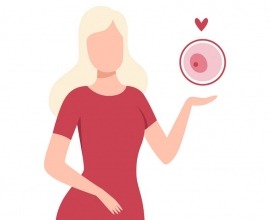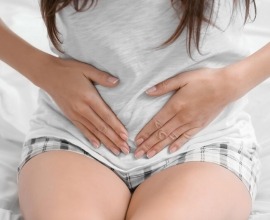WHAT IS FERTILITY? – THE HUMAN EXPLAINED
Defined briefly - fertility is the ability to reproduce: men who are fertile are able to father children, while fertile women are able to get pregnant and carry their baby to full term, with a live birth nine months after conception. These processes take place naturally - as result of the sexual intercourse.
Therefore, fertility is the natural capability of producing a healthy offspring... As a measure - fertility rate is the number of offspring born per mating pair, individual or population. Fertility differs from fecundity, which is defined as the potential for reproduction (influenced by gamete production, fertilization and carrying a pregnancy to term). A lack of fertility is infertility while a lack of fecundity would be called sterility. [1]
Opposite to fertility – infertility is specified as the inability to conceive after 12 months or more of unprotected intercourse. About one in nine couples may experience fertility difficulties... There might be various reasons to depend on both - the male partner and some to the female partner. In the case of suspecting any problems with fertility – it’s advised to research and talk to knowledgeable doctor(s) – as the one(s) in Medical Travel Czech team - who will guide you through the steps of an infertility investigation and relevant treatment, if needed.
Human fertility depends on different factors, which include and not limited to: regular nutrition, sexual behavior, consanguinity, culture, instinct, endocrinology, timing, economics, way of life, and emotions. [2]

What Does Affect Human Fertility?
"Infertility" as term describes the condition, when the couple is unable to achieve pregnancy after 1 year of having regular, unprotected sex, or after 6 months if the woman is older than 35 years of age. Among the factors, which impact the human fertility might be the following ones, although these are suggested options unless proved individually:
-
Age: female age is the most important factor affecting fertility. Women are born with all the eggs they will ever have and the number of eggs available decreases each day from birth onwards. In addition to this decrease in the number of eggs available, the quality of the eggs also declines with the age. Male fertility may also decrease with age although to a much lesser degree.
-
Previous pregnancy: couples are more likely to get pregnant if they have previously achieved a pregnancy together (irrespective of whether or not that pregnancy resulted in the birth of a baby) compared to couples that have never been pregnant.
-
Duration of subfertility: in some cases - the longer couples have been trying to get pregnant, the less likely they are to be successful. If a couple have been trying to get pregnant for less than 3 years they are almost twice as likely to get pregnant than couples who have been trying for more than 3 years.
-
Timing and frequency of sexual intercourse: the most of women have a 28-day menstrual cycle: there are 28 days between the start of one period and the start of the next period. The chance of getting pregnant is low at the beginning of the cycle and starts to increase from about day 8 onwards.
-
Weight: overweight women who have irregular periods are less likely to release an egg each month (ovulate) than women with regular periods. This means the chances of getting pregnant decrease. Being underweight can also affect female fertility as it may mean that an egg might not be released each month. Overweight men may have suboptimal sperm and therefore reduced fertility.
-
Smoking: smokers are 3 times more likely to experience a delay in getting pregnant than non-smokers. Even passive smoking can be harmful. Smoking reduces a woman’s ovarian reserve (so her ovaries will have fewer eggs in them than a woman of the same age who does not smoke) and damages the cilia inside the fallopian tube (which are important for transporting the egg and/or embryo along the fallopian tube into the uterus). In men, smoking may reduce sperm quantity and quality.
-
Caffeine: there is no proven association between caffeine consumption and infertility, however, it may negatively impact on fertility in some individual cases.
-
Alcohol: some studies report that drinking more than 5 units of alcohol per week may reduce female fertility. Although - others state, that low to moderate alcohol consumption may be associated with higher pregnancy rates than non-drinkers. Once pregnant, excessive alcohol consumption may lead to birth defects and developmental delay. For men – an excessive alcohol use complicates maintaining an erection, impaired ejaculation and reduced sperm quality.
-
Drugs: non-steroidal anti-inflammatory drugs - such as ibuprofen - can interfere with ovulation. Aspirin may interfere with implantation. Recreational drugs - such as marijuana and cocaine - may interfere with ovulation and/or the function of the fallopian tube. Anabolic steroids, which are taken by some of the body builders, inhibit the production of sperm with potentially life-length effect.
-
Medical conditions: some women may have medical conditions that can affect their fertility. Some of the conditions may be more general, for example - thyroid disease and vitamin D deficiency - while others may be more specific, for example, polycystic ovary syndrome and endometriosis. [3]
Infertility Treatment Options
Some of the suggested medical treatments for infertility are listed below:
-
Surgery for blocked fallopian tubes can be done via laparoscopy. It involves only small incisions in the abdomen. Once the tubes are clear, the eggs produced by the ovaries can travel more easily towards the uterus, and a natural pregnancy may be possible.
-
Hormone treatment to redress an imbalance can work well in either partner. Thyroid problems and an imbalance of sex hormones can be sometimes corrected by taking artificial hormones.
-
Correction of an anatomical abnormality might include treating a large varicose vein in the testicle that may be blocking sperm release, or correcting retrograde ejaculation.
-
Surgical sperm retrieval defines various surgical methods can be used to extract sperm directly from the testes in men who produce no sperm in their semen. It is regarded as being the part of assisted reproduction…
-
Infertility treatment using intrauterine insemination (IUI) can be used as a first-line infertility treatment in couples who have unexplained infertility, or where the male partner has a low sperm count or sperm that do not swim too well.
Obviously, more specific questions on different infertility treatment programs can be asked after finding a professional ivf doctor – for instance, in Medical Travel Czech. Therefore, selected medical specialist(s) for fertility issues in Czechia can explain any details – as well as – to calm down potential concerns about various risks and possible side effects...
It is also meaningful for both partners to pay attention when undergoing any infertility treatments. Sincere support and understanding of family members, friends, medical staff and those who earlier went through similar infertility programs would play a significant role in successful treatment. [4]
Sources:
[1] Victorian Assisted Reproductive Treatment Authority: Fertility and Infertility
https://www.varta.org.au/information-and-support/fertility-and-infertility
[2] Fertility Network UK: Factors Affecting Fertility
https://fertilitynetworkuk.org/fertility-faqs/factors-affecting-fertility/
[3] US Department of Health and Services: About Fertility and Infertility
https://www.nichd.nih.gov/health/topics/infertility/conditioninfo
[4] Fertility Treatment Abroad: Infertility Treatment Options
https://fertility.treatmentabroad.com/about-infertility/treatment-options














